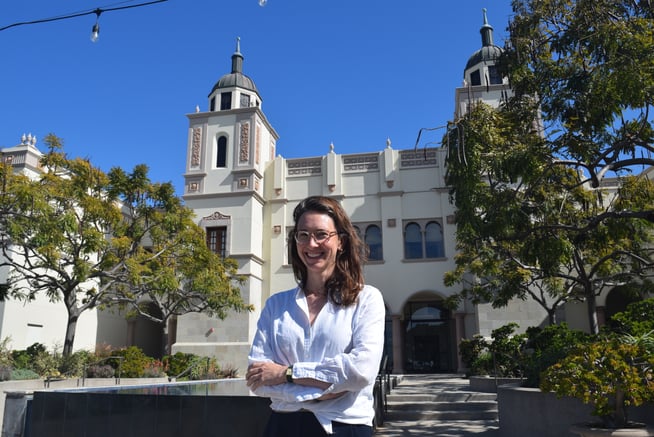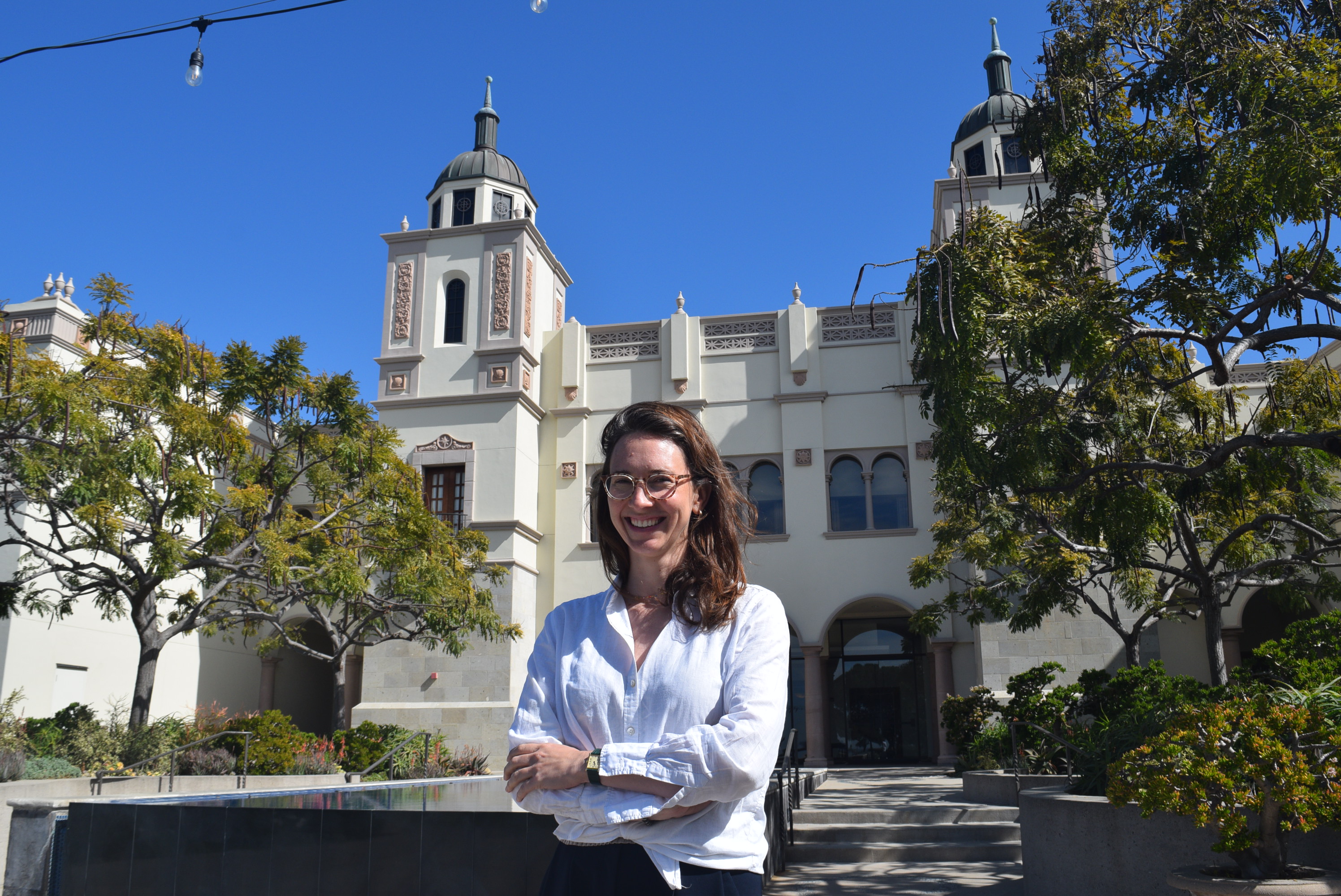Every year, the Kroc School welcomes visiting scholars from around the world to study, conduct research and exchange ideas on peacebuilding with our faculty and students. This year, one of our visiting scholars comes to us from Germany with expertise in social entrepreneurship and innovation; Professor Lisa von der Heydte. To help the University of San Diego and the Kroc School community get to know Professor von der Heydte better, she answered the following questions about her career and life, and the road that led her to the Kroc School.
 Can you please state your name, where you are from, and where you are at in your professional career?
Can you please state your name, where you are from, and where you are at in your professional career?
My name is Lisa von der Heydte, I am from Munich, Germany, and I am a professor for “Management of Social Impact Organizations and Social Entrepreneurship." I am currently here at the University of San Diego as a Kroc School Visiting Scholar.
How would you describe yourself, personally and professionally?
I would describe myself as a social impact enthusiast, I really strive to have a positive impact on social challenges or more generally on people around me. I enjoy bringing people and ideas together that would not necessarily have met otherwise: connecting dots between people but also between different sectors is probably some sort of passion I have. And I guess this is what got me interested in social entrepreneurship in the first place: bridging approaches that have traditionally been associated with other sectors.
I am a very curious person and love to learn new things—so being here at USD is a real treat for me. I find curiosity and openness to learn from each other especially important in my research field: the wheel has been reinvented too many times and I think it’s time to spread and scale approaches that work well and have been tested by others already. I am also -much to the dismay of my family- an extremely structured and organized person who loves all sorts of plans and schedules and there again I am hoping to learn my share from the Californian way of taking things lighter.
Can you tell us about your background and how you became interested in the field of social entrepreneurship and innovation?
I studied business administration and international management in Germany, France, and here in California during my undergraduate studies and then started working in Canada for a public-private organization which is where I realized that the intersection points where different areas, like politics and private business or social challenges and business innovations come together are what really intrigue me. I then went on to studying politics in the UK, France, and Italy during my graduate studies and got my first job at ASHOKA which supports outstanding social entrepreneurs to scale their ideas. During my doctorate, I worked part-time for a re-insurance company where together with two colleagues we started a social impact spin-off: a consultancy for humanitarian organizations that needed guidance in risk management and natural catastrophe data evaluation.
How do you define social entrepreneurship and what makes it unique compared to traditional entrepreneurship?
The main difference between them lies in the definition of the overall goal: whereas a traditional entrepreneur sees a market opportunity first and creates a product or service that customers will pay for, a social entrepreneur sees a challenge first and aims to create a solution to it based on business approaches that have been traditionally rather been associated with commercial for-profit entities.
Can you provide an example of a successful social enterprise that you admire and explain why?
I really like the idea of forecast-based financing. I don’t want to just name one specific social enterprise since luckily several organizations have now adopted the approach and it is a great way to showcase social entrepreneurial spirit: forecast-based financing is the application of the latest scientific data (e.g. on natural catastrophe risk) onto the humanitarian context. I like it because it is too straightforward, saves NGOS millions of dollars, and most of all: it can save millions of lives. The idea behind it is very simple: enable NGOs early access to humanitarian funding based on in-depth forecast information and risk analysis. As an example: The spread of Malaria can relatively well be forecasted based on temperature and humidity which means that organizations can act early based on smart risk analysis. Temperatures of 18-32C and humidity of at least 60% are optimal for mosquitoes to survive long enough to acquire and transmit the malaria parasite which means that given these forecasts, organizations have a very accurate time window where they can act on prevention.
How do you see the future of social entrepreneurship evolving in the next 5-10 years?
I really hope that by then we won’t be speaking about social vs. business innovations and rather that social innovations become the new normal. There is definitely a trend that customers today expect more from the companies that they buy from than just the product: many customers today want to understand the circumstances under which a product was produced or about the ingredients or raw materials… I am optimistic about the future of social entrepreneurship.
What excited you about this opportunity to be a visiting scholar at the Kroc School?
It really is remarkable what the Kroc School has achieved in the field of Social Innovation and the curriculum it has developed for USD students. So what I am hoping to gain from my time as a visiting scholar is: (1) Learning from the Kroc School's experience in building a curriculum around Social Innovation and the various activities and events that have been initiated – above all the amazing Fowler Global Social Innovation Challenge since at my home university in Munich, we are currently developing our own social innovations curriculum and are in the process of founding a social innovation accelerator program for our students and welfare organizations. And (2) I would like to focus in my research on the different routes that social innovations take here: Where and who develops social innovations and what is the macroeconomic effect, where do they feed into the welfare system, how are they scaled. Basically, I am trying to understand the road that social innovations can take — which kinds of innovations survive standalone in the free market are which ones are integrated into the city administration for example?
And to be very honest: the USD campus is just incredibly beautiful, and I do enjoy the time away from the cold and snow in Munich.
What advice would you give to aspiring social entrepreneurs who are just starting out?
Enjoy the ride. It’s the experiences that you gain in the way that shape the product or service. In the social innovation sector, you have the freedom to be the first mover in many regards since you are not inventing just another pizza delivery service. That is also what I personally find the most exciting and rewarding about the founding phase: trial and error on repeat.

About the Author
The Joan B. Kroc School of Peace Studies (Kroc School) at the University of San Diego is the global hub for peacebuilding and social innovation. Founded in 2007, the Kroc School equips the next generation of innovative changemakers to shape more peaceful and just societies. We offer master's degrees in peace and justice, social innovation, humanitarian action, conflict management and resolution, and a dual degree in peace and law — programs that have attracted diverse and dynamic students from more than 50 countries. In addition to our graduate programs, the Kroc School is home to the Kroc Institute for Peace and Justice (Kroc IPJ). Founded in 2001, the Institute supports positive change beyond the classroom. Through groundbreaking research, experiential learning, and forward-thinking programs, the Kroc School and Kroc IPJ are shaping a future in which peaceful co-existence is the new normal.






